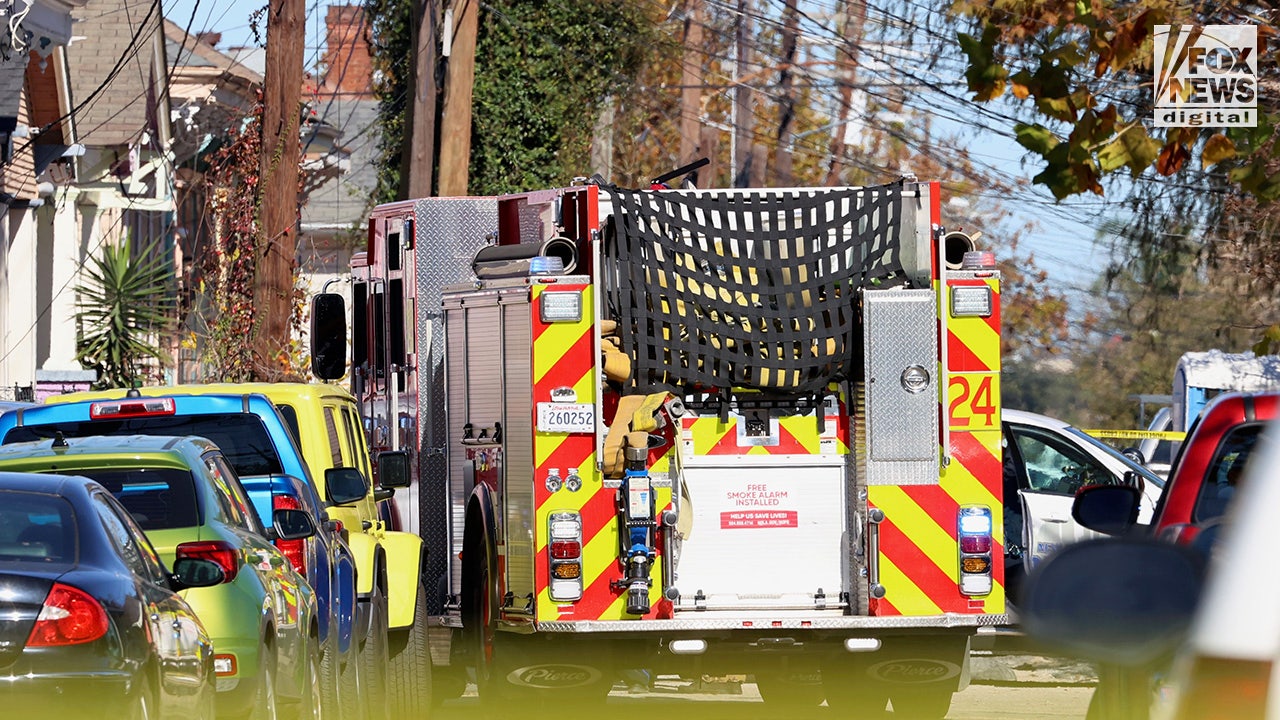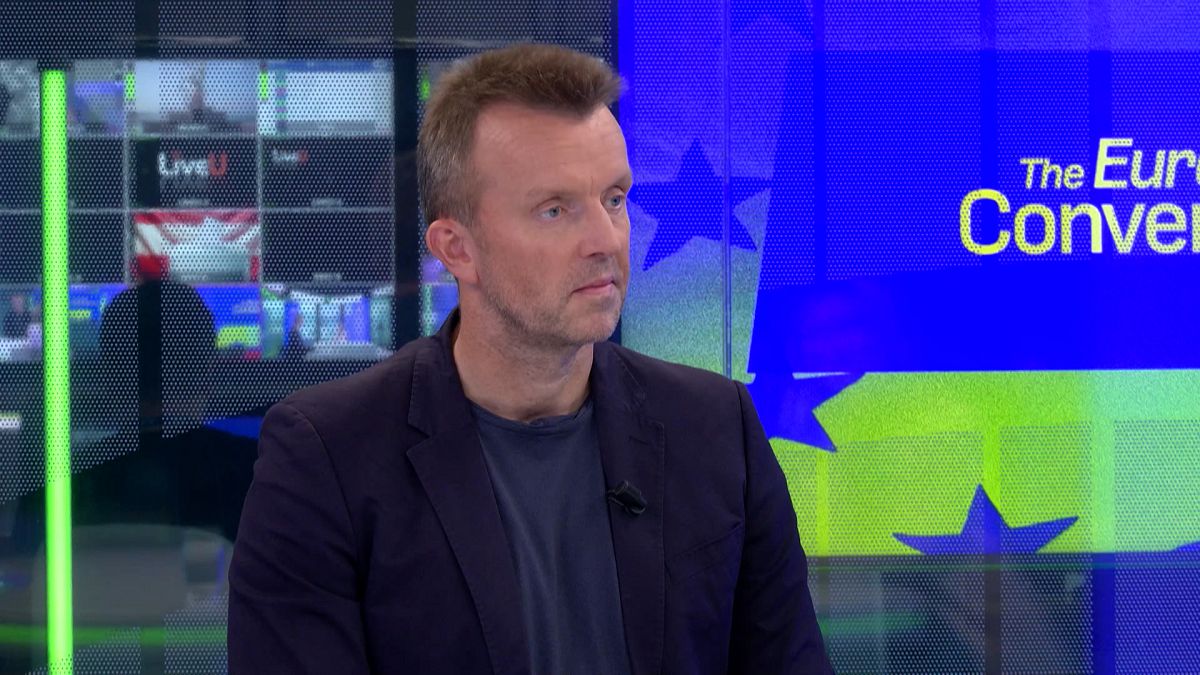Amid war in Ukraine, the rapidly unfolding conflict in the Middle East and uncertainty about future relations with US, the EU has rarely faced such challenging times. Jacob Kirkegaard, Senior Fellow at the Bruegel thinktank shares his views on what the coming years may hold.
A new commission, a new European parliament, and a new U.S. administration. What does this all mean for the future of Europe amid a host of global geopolitical challenges? Euronews’ Shona Murray spoke to Jacob Kirkegaard, Senior Fellow at the Bruegel thinktank for the Europe Conversation.
Shona Murray: “I want to start with the Middle East, because obviously this week we had the anniversary of the 7th of October Hamas attack. With that, we’ve seen horrendous conditions in Gaza as a result of the Israeli response and also widened regional spread of war. What implications does this have for Europe?
Jacob Kirkegaard: “Well, I think the short answer is that in economic terms, unfortunately, the implications for Europe really resides on the risk of escalation. AKA That Israel may or may not choose to strike the Iranian oil sector. Iran may then retaliate and oil may rise significantly in price. That’s really the economic risk. Politically for the EU, I think where we have seen over the last number of many months, in fact, that obviously this is a conflict that retains this ability to mobilise significant segments of European populations. It varies from country to country. But what what you lack basically for the EU is of course, unity.”
Shona Murray: “And one of the sort of charges levelled against the EU in relation to this is double standards, that there isn’t the same support or empathy for the Palestinians as there is for Ukrainians, and that has impacted the EU’s, I suppose, reputation within the Global South, something that Brussels has been trying to garner support for when it comes to the war in Ukraine. How do you see this playing out?”
Jacob Kirkegaard: “Well, I think this is true. I mean, I think it’s important for Europeans to recognise that while we clearly view the conflict in Ukraine as the first existential armed conflict, really threatening the military security of Europe, arguably in the numbers since World War Two in some ways, or certainly since the end of the Cold War. And therefore, we view that rightfully, in my opinion, as an existential crisis. But in the eyes of the global South, who do not fear imminent invasion by Russia, well, it’s just another regional conflict. So that we in Europe, but also in the broader G7, are sort of trying to actively solicit their support for Ukraine for what in their eyes is a regional conflict, while we, again, in their eyes, are ignoring not just the Israel-Palestine conflict, but many other regional conflicts, armed conflicts across the global South. Yes, in their eyes, that that’s clearly hypocrisy. And I think, again, if you look from where they come, they have a point.”
Shona Murray: “So we see it as an existential crisis. Yet at the same time, we hear from the Ukrainians, from President Zelensky, we don’t have enough weapons.”
Jacob Kirkegaard: “Well, I think there’s no doubt that Ukraine is continues to fight a very determined and very much larger neighbour in Russia. So they are inherently the underdog, if you can put it that way. They have received very significant amounts of financial and military support from the West. But the war is entering now, is well into its third year. And there are concerns not just with the upcoming US presidential election, but also domestic politics in many European countries. Is this sustainable? I think the good news, in my opinion, is that I believe in Europe, with the clear exception of Hungary, possibly Slovakia. But let’s put it this way all the countries in Europe with real money and military capabilities are strongly behind Ukraine. I suspect that situation will persist precisely because we do have to view this conflict as an existential one, because I think it is naive to assume that if Russia were to prevail in Ukraine, that they would quote unquote, just stop at those four provinces that they have already annexed.”
Shona Murray “But at the same time, we’ve heard from President Zelenskyy as his vision for ending the war, his victory plan, which he presented at the United Nations General Assembly at Ramstein in Germany, to NATO’s allies. And the response has been tepid. There’s no complete embrace of this response from the United States, which hasn’t said it can give support for it for example, the use of long range weapons into Russian territory. We’ve heard Chancellor Scholz saying Germany would never agree to that. And what we do know of the plan is that it’s very offensive. So it doesn’t appear that the allies are, you know, foursquare behind Zelenskyy on this.”
Jacob kirkegaard: “I think you need to have Russia put under military pressure. But I think that is really what this plan strives to do. That will require, clearly in the eyes of President Zelenskyy and the Ukrainian government, the ability to strike strategic targets with Western weapons deep in Russian territory. Clearly, as you mentioned, the US government, the German government do not see it that way. But there are other European governments, including those who have delivered F-16s and other missiles, a long range missile to them that actually are in favour of it. So we will see where we end up. I think it should also be mentioned, and I think this is, again, one of these areas which at least gives me a relatively high degree of optimism actually about Ukraine’s ability to ultimately prevail, which is the growth of Ukraine’s domestic military industrial complex and capabilities where we have seen in recent weeks and months the rising use of accurate long range drone strikes by Ukraine on Russian ammunition depots, energy storage facilities, etc..”
Shona Murray: “At the 75th anniversary of NATO in Washington, D.C., Ukraine was told there was an indestructible bridge towards membership. Not quite membership, but no timeline. Do you think Ukraine will become a member of NATO or do you foresee that it may have to give up NATO membership, at least in the short to medium term, in order to negotiate Russia leaving its territory?”
Jacob Kirkegaard: “think they will become a member of NATO. But I think it is arguably more important for Ukraine that they become a member of the EU, because I think that ultimately Ukraine will prevail in this war, meaning that they are able to deter Russian aggression even without being a member of NATO, provided that they have access to ongoing Western financial and military support, which in principle they could have without being a member of NATO. What matters for Ukraine, however, in the long run is money; financing to rebuild the economy and full integration with the EU so that they can completely turn their back – which is clearly what they want – to any links in the energy sector and otherwise with Russia. That requires, in my opinion, full EU membership in the relatively near to medium term, meaning…
Shona Murray: “By 2030?”
Jacob Kirkegaard: “Yeah, early 2030s and this ironically also in my opinion, would prove a much bigger long term threat to Vladimir Putin and indeed the entire Russian regime, because what this would provide Ukraine was an opportunity to become, I would argue, a fast growing market, economy based democracy, fully anchored in the EU, clearly showing the Russian population that there is an alternative to the autocracy perpetrated on them by Vladimir Putin and his likely successors.”
Shona Murray “Do you not think countries like Hungary will go out of their way to block Ukraine’s accession every step of the way, which we’ve seen so far?
Jacob Kirkegaard: “Viktor Orban will try to curry favour with his true political masters, which are, in my opinion, in Moscow, and increasingly also in Beijing. He may try that, but ultimately we are now seeing the growth of domestic opposition parties in Hungary. If we manage by the rest of the EU to continue the financial squeeze on Hungary through the budget, I think at the end of the day and again, we’re talking maybe ten years for the final decision for Ukrainian membership to be taken, It is not clear that the Hungarian regime, if I may use that word, will have that level of longevity given the domestic developments and ongoing I hope, economic pressure that he will face within the EU.”
Shona Murray “And when you say political paymasters, do you mean because of the investment Beijing and Moscow have in Hungary?”
Jacob Kirkegaard: “I mean, I think it is clear that Hungary, having clearly written off, I would argue, many of the future currently frozen and future transfers from the EU. What have they done instead? Clearly with regard, they continue to illicit Russian energy imports, including building a new nuclear power plant. With the case of China, he has signed, among other things, clearly, in my opinion, to continue to offer, if you like, uniquely politically preferred destination for Chinese investment in the EU, a security treaty with China that allows Chinese police officers to patrol with Hungarian police officers on the streets of Hungary. That is something that no other EU member can offer and may in fact choose to. Maybe that’s the deciding political factor when the Chinese, quote unquote, private companies or state owned companies choose where to locate their investments.”
Shona Murray: “Just final question before you go. It’s three weeks to go to the US election and what are your predictions? And, you know, regardless of who wins, do you think that Europe is on its way to de-risk from its relationship with the United States, or is that just impossible, at least for the short term?”
Jacob Kirkegaard: “Yeah, I think it is in the short term. In a military sense, it is clearly impossible. I mean, NATO without a fully committed United States is just not NATO. At the same time, I think the fact, irrespective of who wins, the fact that a candidate like Donald Trump might be re-elected, I mean, he could actually win and be re-elected, in my opinion, clearly cast doubt about the long term viability of, or the value, if you like, of NATO’s Article five. So irrespective of who wins, Europe doesn’t have any choice other than to do what some of the things that was in the Draghi report as well to achieve a much higher degree of self-sufficiency and military national security issues. The EU can only achieve that if we manage to fully integrate Ukraine into the European economies because we are already seeing the growth of domestic Ukrainian weapons production. They have an existing military industrial complex. They will become, I think, the arsenal of the EU.”
Click on the video above to watch the full interview.



